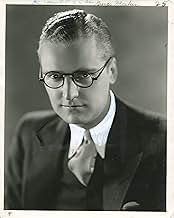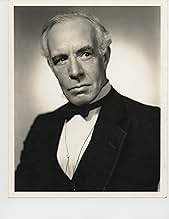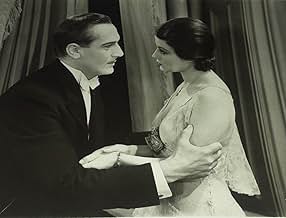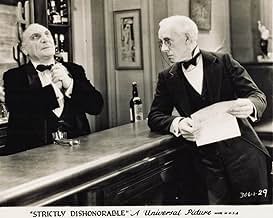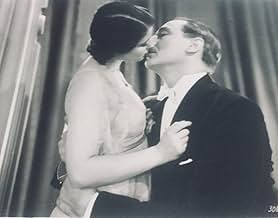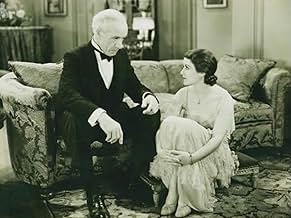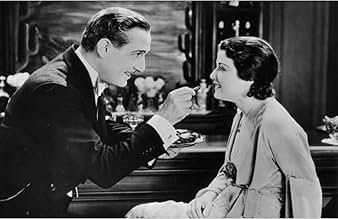A womanizing singer falls for an old-fashioned Southern belle. The problem is, she already has a fiance.A womanizing singer falls for an old-fashioned Southern belle. The problem is, she already has a fiance.A womanizing singer falls for an old-fashioned Southern belle. The problem is, she already has a fiance.
- Awards
- 3 wins total
Samuel Bonello
- Waiter
- (uncredited)
Aldo Franchetti
- Arguing Customer
- (uncredited)
Joseph W. Girard
- Officer
- (uncredited)
Carlo Schipa
- Waiter
- (uncredited)
Joe Torillo
- Cook
- (uncredited)
- Director
- Writers
- All cast & crew
- Production, box office & more at IMDbPro
Featured reviews
This film is a fairly faithful adaptation of a Sturges play and, unfortunately, it's stage origins show a little too plainly. One can even fairly easily tell where the Act divisions would have been.
The rhythms and confined locations betray its source-while there are witty passages, other parts do not have a snappy enough pace too advance the fairly sparse (and predictable) plot. Charming performances and has its moments, but Sturges was part of other substantially better scripts in the 30s, that have aged much better. It seems likely that the, for its time, racier elements of the plot held the attention more in its day.
Did like the jokes at the expense of West Orange, New Jersey though!
The rhythms and confined locations betray its source-while there are witty passages, other parts do not have a snappy enough pace too advance the fairly sparse (and predictable) plot. Charming performances and has its moments, but Sturges was part of other substantially better scripts in the 30s, that have aged much better. It seems likely that the, for its time, racier elements of the plot held the attention more in its day.
Did like the jokes at the expense of West Orange, New Jersey though!
STRICTLY DISHONORABLE (Universal, 1931), directed by John M. Stahl, stars Paul Lukas (courtesy of Paramount Pictures), Sidney Fox and Lewis Stone (on loan from Metro-Goldwyn-Mayer), in this screen adaptation from the original stage play by Preston Sturges, years before winning fame as a comedy director for Paramount Pictures in the 1940s. With the screenplay by Gladys Lehman, which was reportedly said to have stuck close to the play and mood, this screen adaptation, virtually a filmed stage play, comes to life through much of its then risque dialogue that would never have gone passed the production code of 1934.
Plot summary: Isabelle Parry (Sidney Fox) is a Southern gal engaged to marry the bespectacled stuffy bond salesman, Henry Greene (George Meeker). While driving down the crowded New York City streets of Broadway (with movie marque of Maurice Chevalier starring in "The Smiling Lieutenant" visible) on their way home to New Jersey, the couple decide to stop at a speakeasy. Managed by Tomasso (William Riccardi), the bar also consists of a former judge, Dempsey (Lewis Stone) having a few "old fashions." While Dempsey befriends Isabelle, he gets turned off by Henry's arrogance. Also entering the scene is Gus Di Ruva (Paul Lukas), a famed opera singer better known by his stage name of Tino Caraffa. Like the kindly judge, who lives in the apartments above, he also gets turned off by Henry's unlikable personality. As Officer Mulligan (Sidney Toler) asks the owner (Henry) whose car is parked next to a fire hydrant to have it moved, during his absence, Isabelle and Gus become better acquainted during their dancing to the record playing tune of "It Happened in Monterey," Discovering this, Henry's jealousy and rude remarks force Isabelle to call off their engagement. Wanting to have Mulligan arrest Gus and Tomasso for the abduction of Isabelle, Henry ends up jailed instead. In the meantime, with no place else to go, the free-spirited Isabelle, who has been living with Henry and his parents under the same household, is offered a place to stay - being Gus's apartment on a "strictly dishonorable" basis. While the judge feels Isabel to be immoral and that she's be better off staying at the Martha Washington Hotel instead, Gus comes to the conclusion of buying her train tickets back to where she came from, but begins to have second thoughts. Situations occur when Henry, released from jail, returns to the scene.
In general, STRICTLY DISHONORABLE is a showcase for Sidney Fox. She not only gets enough camera closeups, but is virtually in every scene. Her Southern accent comes similar to her performance in THE MOUTHPIECE (Warners, 1932), for which she once more plays a girl from the South. Lewis Stone, who interestingly was featured in a similar sounding movie title, STRICTLY UNCONVENTIONAL (MGM, 1930), is perfect as the moral-minding judge, a role no different from his Judge Hardy portrayal in the "Andy Hardy" family series (1937-1946) for his home studio of MGM. The top-billed Paul Lukas is perfectly cast as the accented-speaking opera singer whose character is hinted as one being a ladies man and no stranger of having women living in his quarters. His girlfriend, Lilli (never seen) is passed off as his cousin to Isabel.
One interesting aspect for STRICTLY DISHONORABLE is the camera tracking through windows and stairways to keep this 91 minute production from being virtually stage-bound. Maybe not as amusing as it was back in 1931, STRICTLY DISHONORABLE comes as surprising through its frankness as the Isabelle character showing no shame in saying she lives with her fiance. This dark-haired beauty with a male-sounding name, Fox proves herself worthy in what might be considered her best screen performance to her short-lived movie career. Situations move briskly throughout the story, especially how one could fall in love and want to marry a total stranger the very same evening of their first encounter. George Meeker is strictly obnoxious in character while William Riccardi (reprising his stage role) is strictly available throughout for comedy relief gestures involving both judge and opera singer friends.
Unavailable for viewing due to the 1951 MGM remake starring Enzio Pinza and Janet Leigh, which has been softer in tone, this 1931 original, which has never been distributed to either video cassette and DVD, has been rediscovered to a new generation of movie lovers in 1997 on cable television's Turner Classic Movies. Though broadcasts for the original STRICTLY DISHONORABLE have been limited, the film in general is strictly worth viewing mainly out of curiosity. (***)
Plot summary: Isabelle Parry (Sidney Fox) is a Southern gal engaged to marry the bespectacled stuffy bond salesman, Henry Greene (George Meeker). While driving down the crowded New York City streets of Broadway (with movie marque of Maurice Chevalier starring in "The Smiling Lieutenant" visible) on their way home to New Jersey, the couple decide to stop at a speakeasy. Managed by Tomasso (William Riccardi), the bar also consists of a former judge, Dempsey (Lewis Stone) having a few "old fashions." While Dempsey befriends Isabelle, he gets turned off by Henry's arrogance. Also entering the scene is Gus Di Ruva (Paul Lukas), a famed opera singer better known by his stage name of Tino Caraffa. Like the kindly judge, who lives in the apartments above, he also gets turned off by Henry's unlikable personality. As Officer Mulligan (Sidney Toler) asks the owner (Henry) whose car is parked next to a fire hydrant to have it moved, during his absence, Isabelle and Gus become better acquainted during their dancing to the record playing tune of "It Happened in Monterey," Discovering this, Henry's jealousy and rude remarks force Isabelle to call off their engagement. Wanting to have Mulligan arrest Gus and Tomasso for the abduction of Isabelle, Henry ends up jailed instead. In the meantime, with no place else to go, the free-spirited Isabelle, who has been living with Henry and his parents under the same household, is offered a place to stay - being Gus's apartment on a "strictly dishonorable" basis. While the judge feels Isabel to be immoral and that she's be better off staying at the Martha Washington Hotel instead, Gus comes to the conclusion of buying her train tickets back to where she came from, but begins to have second thoughts. Situations occur when Henry, released from jail, returns to the scene.
In general, STRICTLY DISHONORABLE is a showcase for Sidney Fox. She not only gets enough camera closeups, but is virtually in every scene. Her Southern accent comes similar to her performance in THE MOUTHPIECE (Warners, 1932), for which she once more plays a girl from the South. Lewis Stone, who interestingly was featured in a similar sounding movie title, STRICTLY UNCONVENTIONAL (MGM, 1930), is perfect as the moral-minding judge, a role no different from his Judge Hardy portrayal in the "Andy Hardy" family series (1937-1946) for his home studio of MGM. The top-billed Paul Lukas is perfectly cast as the accented-speaking opera singer whose character is hinted as one being a ladies man and no stranger of having women living in his quarters. His girlfriend, Lilli (never seen) is passed off as his cousin to Isabel.
One interesting aspect for STRICTLY DISHONORABLE is the camera tracking through windows and stairways to keep this 91 minute production from being virtually stage-bound. Maybe not as amusing as it was back in 1931, STRICTLY DISHONORABLE comes as surprising through its frankness as the Isabelle character showing no shame in saying she lives with her fiance. This dark-haired beauty with a male-sounding name, Fox proves herself worthy in what might be considered her best screen performance to her short-lived movie career. Situations move briskly throughout the story, especially how one could fall in love and want to marry a total stranger the very same evening of their first encounter. George Meeker is strictly obnoxious in character while William Riccardi (reprising his stage role) is strictly available throughout for comedy relief gestures involving both judge and opera singer friends.
Unavailable for viewing due to the 1951 MGM remake starring Enzio Pinza and Janet Leigh, which has been softer in tone, this 1931 original, which has never been distributed to either video cassette and DVD, has been rediscovered to a new generation of movie lovers in 1997 on cable television's Turner Classic Movies. Though broadcasts for the original STRICTLY DISHONORABLE have been limited, the film in general is strictly worth viewing mainly out of curiosity. (***)
Although co-written by Preston Sturges this one seems to have a bit of the Lubitsch touch in it and it's quite odd considering it's a Laemmle era Universal film. Isabel (Sidney Fox) and Henry (George Meeker) are an engaged couple. Isabel is a Southerner, Henry hails from New Jersey. Besides the country mouse/city mouse differences between them, Henry is completely unlikeable and thinks the worst of everyone. Apparently he was nice to Isabel until the engagement ring went on and then he changed. When asked about it he tells her "well you didn't expect me to stay all sappy forever did you?" He tells Isabel to stop thinking and leave her happiness to him, is very disrespectful of her, and is always trying to pick a fight with someone.
They stop in for a drink at a speakeasy full of characters, and here is where the trouble starts. When Henry goes outside of the bar to deal with his illegally parked car, Isabel makes the acquaintance of the dashing opera singer Count Gus Di Ruvo (Paul Lukas), and it is lust at first sight. George returns, makes some insulting remarks and then demands to Isabel, she calls off the engagement, and Henry storms out. Isabel and the Count take the opportunity to go off to the Count's apartment upstairs. Incredulous that Isabel would ever do anything on her own, Henry enlists the help of the police to round up the scoundrels who must have kidnapped her.
Now Isabel knows the Count's intentions are "strictly dishonorable" - he's quite upfront about his lady's man status - yet she's considering sleeping with him. When the Count discovers Isabel is a virgin, his demeanor changes completely. Back in the days of chivalry, most guys - honorable ones - don't mind being a casual second but are queasy about being a casual "first". He tramps upstairs to sleep at the judge's apartment. The Count acts quite horrid to Isabel, and you can't tell if it is because he is awestruck or horrified because he has finally almost gotten involved with an actual virgin.
This leaves Isabel in quite a fix. She's already said she can't go back to Mississippi because of the gossip it would cause, Henry has gotten on her last nerve even if he should choose to return, and now the Count has run out on her. How will all of this work out? Watch and find out.
For some reason MGM loaned Lewis Stone out to Universal to play the part of a drunken judge who tries to prevent Isabel from taking a false step by staging all kinds of interruptions for the couple, and in the process he almost steals the show. An odd but amusing turn for an actor who ten years later will be known far and wide as the sober Judge Hardy of the Andy Hardy films. Sidney Toler, who later plays Charlie Chan, here plays an Irish cop who has no problem with the speakeasy that the cast is patronizing, and in fact seems pretty friendly with all concerned.
This film is a bit stagy and static, which is understandable given that it is based on a play, but it is worth sticking with it for the witty dialogue and the rather clever although partially expected denouement. A very worthy early talkie with a fine cast.
They stop in for a drink at a speakeasy full of characters, and here is where the trouble starts. When Henry goes outside of the bar to deal with his illegally parked car, Isabel makes the acquaintance of the dashing opera singer Count Gus Di Ruvo (Paul Lukas), and it is lust at first sight. George returns, makes some insulting remarks and then demands to Isabel, she calls off the engagement, and Henry storms out. Isabel and the Count take the opportunity to go off to the Count's apartment upstairs. Incredulous that Isabel would ever do anything on her own, Henry enlists the help of the police to round up the scoundrels who must have kidnapped her.
Now Isabel knows the Count's intentions are "strictly dishonorable" - he's quite upfront about his lady's man status - yet she's considering sleeping with him. When the Count discovers Isabel is a virgin, his demeanor changes completely. Back in the days of chivalry, most guys - honorable ones - don't mind being a casual second but are queasy about being a casual "first". He tramps upstairs to sleep at the judge's apartment. The Count acts quite horrid to Isabel, and you can't tell if it is because he is awestruck or horrified because he has finally almost gotten involved with an actual virgin.
This leaves Isabel in quite a fix. She's already said she can't go back to Mississippi because of the gossip it would cause, Henry has gotten on her last nerve even if he should choose to return, and now the Count has run out on her. How will all of this work out? Watch and find out.
For some reason MGM loaned Lewis Stone out to Universal to play the part of a drunken judge who tries to prevent Isabel from taking a false step by staging all kinds of interruptions for the couple, and in the process he almost steals the show. An odd but amusing turn for an actor who ten years later will be known far and wide as the sober Judge Hardy of the Andy Hardy films. Sidney Toler, who later plays Charlie Chan, here plays an Irish cop who has no problem with the speakeasy that the cast is patronizing, and in fact seems pretty friendly with all concerned.
This film is a bit stagy and static, which is understandable given that it is based on a play, but it is worth sticking with it for the witty dialogue and the rather clever although partially expected denouement. A very worthy early talkie with a fine cast.
A near-verbatim filming of Preston Sturges' 1929 Broadway hit, this is a surprisingly assured and technically polished film for one made just a couple of years into the sound era. Paul Lukas is a perfect Gus, and Sidney Fox makes a wonderfully sexy southern minx. Lewis Stone's turn as a (somewhat) drunken Judge is particularly fun for those who know him mainly as that paragon of sobriety, Judge Hardy. Though it lacks the genius of Surges' self-directed screenplays, this one is charming and human, and a must for the serious Sturges fan -- though it's not easy to find (I saw a rare screening last fall at the L.A. County Museum of Art).
Perhaps "Strictly Dishonorable" played well back in 1931, but today it's a very boring talk-fest--and about as enjoyable as having a migraine. If you do watch it, don't say I didn't warn you! The film begins with a dopey couple (he from New Jersey, she from Mississippi) who seem to have nothing in common. In fact, soon after they arrive, she starts flirting with a real Lothario (Paul Lukas) and he stomps off to sulk. In the meantime, an ex-judge (Lewis Stone) takes it on his own to try to save her from this playboy's advances, though she CLEARLY knows his intentions are strictly dishonorable.
This was originally a stage production written by Preston Sturges. However, despite him being a highly respected writer, here his work just seems VERY dated. It also looks just like a play put directly on the screen--with little action and LOTS of talk, talk, talk. In fact, it's such a talk-fest that I honestly have rarely ever felt this bored by a film. Occasionally hammy acting didn't help any. Overall, I can't even think of a reason to watch this film--it's bad but not in a funny or ridiculous way...it's just BAD!
This was originally a stage production written by Preston Sturges. However, despite him being a highly respected writer, here his work just seems VERY dated. It also looks just like a play put directly on the screen--with little action and LOTS of talk, talk, talk. In fact, it's such a talk-fest that I honestly have rarely ever felt this bored by a film. Occasionally hammy acting didn't help any. Overall, I can't even think of a reason to watch this film--it's bad but not in a funny or ridiculous way...it's just BAD!
Did you know
- TriviaThe play opened in New York City, New York, USA at the Avon Theater on 18 September 1929 and ran for 557 performances. William Ricciardi originated his role in the play, and Louis Jean Heydt was also in the cast.
- ConnectionsReferenced in American Grindhouse (2010)
Details
- Release date
- Country of origin
- Languages
- Also known as
- När oskulden sover...
- Filming locations
- Production company
- See more company credits at IMDbPro
- Runtime
- 1h 31m(91 min)
- Color
Contribute to this page
Suggest an edit or add missing content

